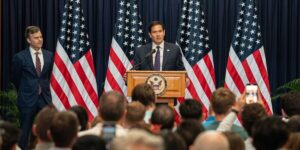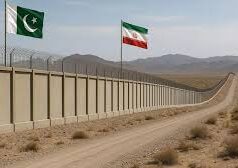US Secretary of State Marco Rubio has called on India and Pakistan to work together to de-escalate tensions following the deadly April 22, 2025, terror attack in Pahalgam, Jammu and Kashmir, which killed 26 civilians. In separate phone calls on Wednesday with Indian External Affairs Minister S. Jaishankar and Pakistani Prime Minister Shehbaz Sharif, Rubio emphasized the need for cooperation to maintain peace and security in South Asia, according to the US State Department.

The Pahalgam attack, initially claimed by The Resistance Front (TRF), a proxy of the Pakistan-based Lashkar-e-Taiba (LeT), has reignited longstanding tensions between the nuclear-armed neighbors. India has accused Pakistan of supporting the attack, while Pakistan denies involvement and has called for a neutral investigation. The situation has been further inflamed by ceasefire violations along the Line of Control (LoC) for seven consecutive days, reciprocal airspace bans, India’s suspension of the 1960 Indus Waters Treaty, and the closure of the Attari-Wagah border crossing.
During his call with Jaishankar, Rubio expressed sorrow for the lives lost and reaffirmed the United States’ commitment to cooperating with India in combating terrorism. He also encouraged India to engage with Pakistan to reduce tensions. In his conversation with Sharif, Rubio urged Pakistan to condemn the attack and cooperate fully in investigating what he described as an “unconscionable” act of terror, while stressing the importance of re-establishing direct communications between the two nations.
State Department spokesperson Tammy Bruce underscored Washington’s active engagement, noting that the US is in touch with both countries at multiple levels to prevent further escalation. “The world is watching,” Bruce said, adding that Rubio has encouraged other global leaders to reach out to India and Pakistan to support a peaceful resolution.
Pakistani Prime Minister Sharif, in response, accused India of “escalatory and provocative behavior” and urged the US to press New Delhi to “dial down the rhetoric.” He rejected allegations linking Pakistan to the attack and reiterated the need for a transparent probe, citing Pakistan’s own sacrifices in the fight against terrorism, including over 90,000 lives lost and $152 billion in economic damages.
India’s Foreign Minister Jaishankar, meanwhile, emphasized the need for accountability, stating on X that India is resolved to bring the “perpetrators, planners, and backers” of the attack to justice. He expressed appreciation for the UN Secretary-General Antonio Guterres’ condemnation of the attack and noted India’s diplomatic outreach to non-permanent UN Security Council members to reinforce its stance against terrorism.
The US has publicly condemned the Pahalgam attack, with President Donald Trump and Vice President JD Vance expressing solidarity with India, but has refrained from criticizing Pakistan directly. Analysts note that India’s growing strategic importance as a counterweight to China contrasts with Pakistan’s diminished role as a US ally following the 2021 Afghanistan withdrawal, shaping Washington’s balanced approach.
International calls for restraint have intensified, with the United Nations and the United Kingdom also urging both nations to avoid actions that could lead to a broader conflict. As tensions persist, Rubio’s diplomatic outreach marks the highest level of US engagement to defuse the crisis since the attack, with Washington advocating for a “responsible solution” to prevent further escalation between the two nuclear powers.






